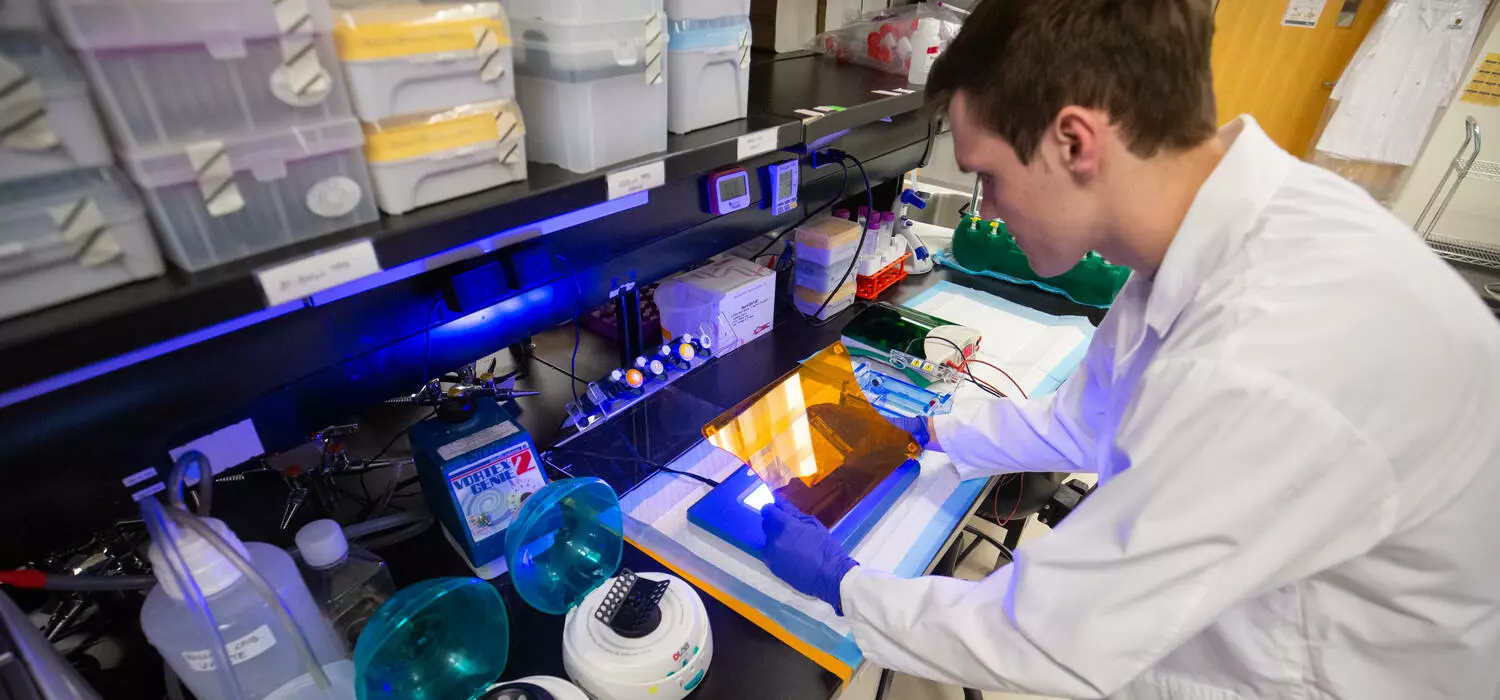Dr. Pierre Billon, Ph.D., grew increasingly frustrated with the lengthy turnaround times and high costs of obtaining genetic analysis from specialized private laboratories. The delay in receiving DNA sample results, often spanning weeks to months, posed significant obstacles to his research endeavors.
 Ph.D. student Jethro Langley uses light to visualize results from the One-pot DTECT kit. Image Credit: Riley Brandt, University of Calgary
Ph.D. student Jethro Langley uses light to visualize results from the One-pot DTECT kit. Image Credit: Riley Brandt, University of Calgary
Recognizing the need for a more efficient and cost-effective approach, Billon, his research associate Lou Baudrier and visiting student researcher Orléna Benamozig, embarked on a mission to devise an alternative solution.
We have developed a method which is so simple to implement and use that any lab, anywhere in the world can readily establish their own kit, to achieve a same-day analysis of genetic mutations for a few cents per sample, and we are really excited at our homemade system’s capabilities and its versatility for various applications in the clinical setting.”
Dr. Pierre Billon, Assistant Professor, Cumming School of Medicine
The system, known as One-pot DTECT, is a small kit that includes several enzymes and distinct DNA fragments that may identify genetic markers. Three methods can be used to analyze the genetic data: quantitative, qualitative, and visual.
One-pot DTECT can confirm the presence of variants and determine the frequency of these mutations precisely, and accurate detection of genomic sequences and their mutations is critical for various application in research and clinical settings.”
Dr. Pierre Billon, Assistant Professor, Cumming School of Medicine
The researchers contacted Dr. Nicola Wright, B.Sc., M.D., a Pediatric Hematologist and Immunologist at the Alberta Children's Hospital, to validate the accuracy in a clinical setting. Blood problems, including sickle cell anemia, brought on by genetic abnormalities, are one of Wright's specialties.
The researchers ran a blind study to see if One-pot DTECT may work well as a quick point-of-care diagnostic tool. There were 21 participants in total: carriers of the mutation but not sickle cell anemia sufferers, as well as controls who did not carry the mutation. The researchers were pleased with the outcomes they discovered that same day.
Billon said, “Our kit identified the various genetic signatures and clearly distinguished affected individuals from carriers and controls with 100% accuracy and zero percent false positives or false negatives.”
Additionally, the researchers verified that the kit may be applied to minute amounts of DNA, such as blood spots.
This has important application for diagnosing newborns and toddlers as it can be difficult to collect blood from children, and blood spots are easier to obtain and early and accurate diagnosis is crucial for initiating appropriate management and treatment strategies.”
Dr. Nicola Wright, Pediatric Hematologist, Alberta Children's Hospital
According to Billon, the kit can be used to identify a variety of genetic abnormalities that cause blood diseases as well as other conditions, including cystic fibrosis. Journal Cell Reports Methods elaborates on the testing procedures used to evaluate One-pot DTECT.
The university's knowledge transfer and business incubator center, Innovate Calgary, is actively negotiating with industry partners for the licensing of One-pot DTECT so that scientists, clinicians, and patients in need can use it. Billon, Baudrier, and Benamozig have a patent application in process through this organization.
Billon created the initial iteration of One-pot DTECT during his tenure as a researcher at New York's Columbia University. That is where they submitted the first patent application.
Source:
Journal reference:
Baudrier, L., et.al., (2024). One-pot DTECT enables rapid and efficient capture of genetic signatures for precision genome editing and clinical diagnostics. Cell Reports Methods. doi.org/10.1016/j.crmeth.2024.100698.